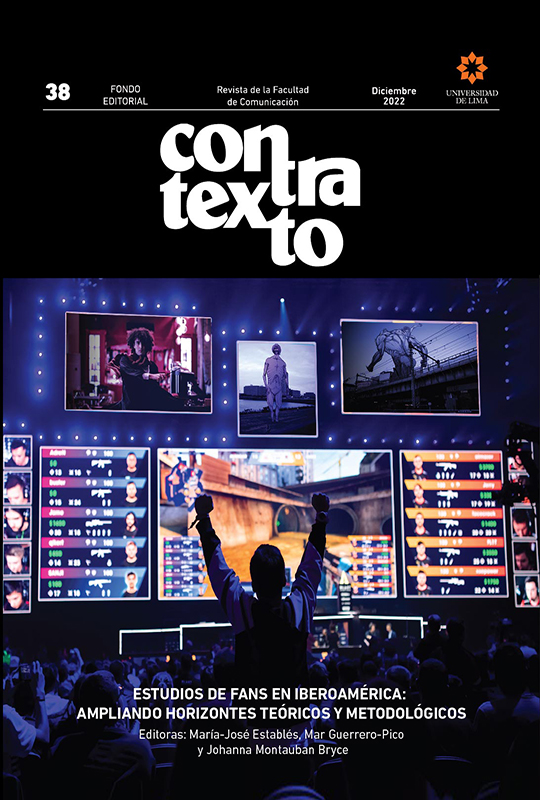Activism and political-feminist participation in Harry Potter’s fandom in Argentina
DOI:
https://doi.org/10.26439/contratexto2022.n038.5805Keywords:
fans, quidditch, feminism, appropriationAbstract
This paper investigates the relationship between fandoms and political participation in Argentina. In order to do this, a qualitative approach to Harry Potter’s fandom in the country was carried out through a case studies analysis, focusing on the Circulo de Lectores de Harry Potter and quidditch, recovering previous research by the authors. The article proposes that belonging to a fandom can promote or accompany political and social activism and that the appropriation and creative adaptation of narratives by fans promote positioning in current debates that exceed their object of interest. Likewise, the article proposes that the spaces related to the fandom are safe places in which affinity and activism come together. Finally, it highlights that the feminist agenda impacts the Harry Potter fandom the most.
Downloads
References
Abercrombie, N., & Longhurst, B. (1998). Audiences. A sociological theory of performance andimagination. Sage Publications Ltd. https://dx.doi.org/10.4135/9781446222331
Aguilar, C. (2009). La saga Harry Potter. Interculturalidad y denuncia del racismo. CLIJ: Cuadernos de Literatura Infantil y Juvenil, 227, 48-61. http://repositori.uji.es/xmlui/bitstream/handle/10234/71304/AguilarC_LasagaHarry.pdf?sequence=1&isAllowed=y
Albarello, F. (2020). Henry Jenkins: “Las comunidades de fans se están volviendo políticas”. Austral Comunicación, 9(1). https://doi.org/10.26422/aucom.2020.0901.alb
Aller, R. (2020). ¿Entre fans y devotos? Prácticas, creencias y simbologías de culto en el fandom de Harry Potter (Argentina) [Tesis de licenciatura, Universidad de Buenos Aires]. Repositorio institucional Filo Digital. http://repositorio.filo.uba.ar/bitstream/handle/filodigital/12107/uba_ffyl_t_2020_se_aller.pdf?sequence=1&isAllowed=y
Aller, R. (2021). ¿Qué es ser fan? Un abordaje sobre el fandom de Harry Potter en Argentina. Antropológicas, 17, 24-35. https://revistas.rcaap.pt/antropologicas/article/view/21556
Aller, R., & Cuestas, P. (2020). Las transformaciones de un fandom en tiempos de aislamiento. El caso del Círculo de Lectores de Harry Potter Argentina. Revista Argentina de Estudios de Juventud, 14, e037. https://doi.org/10.24215/18524907e037
Álvarez Gandolfi, F. (2016). La cultura otaku y el consumo fan de manga-animé en Argentina: entre el posmodernismo y la convergencia. Vozes & Diálogo, 15(1), 24-36. https://siaiap32.univali.br/seer/index.php/vd/article/view/8837/5139
Borda, L. (2015). Fanatismo y redes de reciprocidad. La Trama de la Comunicación, 19, 67-87. https://doi.org/10.35305/lt.v19i0.515
Boyd, D. (2014). It’s complicated. The social lives of networked teens. Yale University Press.
Brunner, A. (2016). Harry Potter fans. An anthropological study on identity, practice and the appropriation of the fan object Harry Potter [Tesis de licenciatura, Universidad de Viena]. Repositorio Universidad de Viena. http://othes.univie.ac.at/41960/1/2016-04-11_0903522.pdf
Cavicchi, D. (1998). Tramps like us. Music and meaning among Springsteen fans. Oxford University Press.
Círculo de Lectores de Harry Potter [@chpargentina]. (2020, 3 de junio). Pensábamos abrir el mes de junio con un “Feliz mes del orgullo”… [Imagen]. Instagram. https://www.instagram.com/p/CA-ozpWAcGb/?utm_source=ig_web_copy_link
Cohen, A. (2013). The impacts and benefits yielded from the sport of quidditch [Tesis de doctorado, Universidad de Texas]. CORE. https://core.ac.uk/download/pdf/147237827.pdf
Cuestas, P. (2014). Conociendo el mágico mundo de Harry Potter: sus fans, la relación con la obra y los vínculos que se tejen en el club de lectores [Tesina de licenciatura, Universidad Nacional de La Plata]. Repositorio Memoria Académica. https://www.memoria.fahce.unlp.edu.ar/tesis/te.1087/te.1087.pdf
Cuestas, P. (2018). “Potterheads y feministas”. Experiencias de politización y militancia de lectoras de Harry Potter al calor del debate por la IVE. El Toldo de Astier, 9(17), 44-53. http://www.eltoldodeastier.fahce.unlp.edu.ar/numeros/numero17/pdf/LLDCuestas.pdf
Fiske, J. (1992). The cultural economy of fandom. En L. Lewis (Ed.), The adoring audience: Fan culture and popular media (pp. 30-49). Routledge.
Gómez Cruz, E., & Ardèvol, E. (2017). Ethnography and the field in media(ted) studies: A practice theory approach. Westminster Papers in Communication and Culture, 9(2),27-46. https://doi.org/10.16997/wpcc.172.
Guber, R. (2011). La etnografía. Método, campo y reflexividad. Siglo XXI Editores.
Hang, J. (2020). Feministas y triperas. Mujeres y política en el área de género del club Gimnasia y Esgrima La Plata. Debates en Sociología, 50, 67-90. https://doi.org/10.18800/debatesensociologia.202001.003
Hargreaves, J. (1993). Promesa y problemas en el ocio y los deportes femeninos. En J. Brohm, P. Bourdieu, E. Dunning, J. Hargreaves, T. Todd & K. Young (Comps.), Materiales de sociología del deporte (pp. 83-109). La Piqueta.
Hinck, A. (2012). Theorizing a public engagement keystone: Seeing fandom’s integral connection to civic engagement through the case of the Harry Potter Alliance. Transformative Works and Fan Activism, 10. https://doi.org/10.3983/twc.2012.0311.
Ibarrola, D. (2020). Acerca de la pertinencia de pensar el Quidditch como deporte alternativo. Lúdicamente, 9(18), 1-15. https://www.academia.edu/44210002/Acerca_de_la_pertinencia_de_pensar_el_Quidditch_como_deporte_alternativo
Ibarrola, D. (2021a). A una década de la “independencia” del quidditch argentino: alcances, límites y perspectivas [Ponencia]. 12.° Congreso Argentino de Antropología Social. https://www.academia.edu/52480369/A_una_d%C3%A9cada_de_la_independencia_del_quidditch_argentino_alcances_l%C3%ADmites_y_perspectivas
Ibarrola, D. (2021b). La ética del fandom de Harry Potter y el deporte quidditch: continuidades y rupturas. Cuadernos FHyCS-UNJu, 60, 43-60.
Ito, M., Martin, C., Cody-Pfister, R., Rafalow, M., Salen, K., & Wortman, A. (Eds.). (2019). Affinity online: How connection and shared interest fuel learning. University Press.
Jarvie, G. (2006). Sport, culture and society. An introduction. Routledge.
Jenkins, H. (1992). Textual poachers: Television fans and participatory culture. Routledge.
Jenkins, H. (2006). Convergence Culture. La cultura de la convergencia de los medios de comunicación. Paidós Comunicación.
Jensen, J. (1992). Fandom as pathology: The consequences of characterization. En L. Lewis (Ed.), The adoring audience: Fan culture and popular media (pp. 9-26). Routledge.
Kliger-Vilenchik, N., & Shresthova, S. (2013). Estudo de caso 5: A Harry Potter Alliance: conectando os intereses dos f~as e o envolvimento social. En M. Ito, K. Gutiérrez, S. Livingstone, B. Penuel, J. Rhodes, K. Salen, J. Schor, J. Sefton-Green & S. Craig Watkins (Eds.), Connected learning: An agenda for research and design (pp. 50-54). Digital Media and Learning Research Hub.
Lopes Arantes, P. (2019).“Not in Harry’s name”: Uma análise do ativismo de fas a partir do fandom de Harry Potter [Tesis de licenciatura no publicada]. Universidade Federal de Minas Gerais.
Marradi, A., Archenti, N., & Piovani, J. I. (2007). Manual de metodología de las ciencias sociales. Emecé.
Marrero, A. (2008). Hermione en Hogwarts o sobre el éxito escolar de las niñas. Mora, 14, 29-42. http://www.scielo.org.ar/pdf/mora/v14n1/v14n1a02.pdf
Munro, E. (2013). Feminism: A fourth wave? Political Insight, 4(2), 22-25. https://doi.org/10.1111/2041-9066.12021
Natalucci, A., & Rey, J. (2018). ¿Una nueva oleada feminista? Agendas de género, repertorios de acción y colectivo de mujeres (Argentina, 2015-2018). Revista de Estudios Políticos y Estratégicos, 6(2), 14-34. https://revistaepe.utem.cl/articulos/una-nueva-oleada-feminista-agendas-de-genero-repertorios-de-accion-ycolectivos-de-mujeres-argentina-2015-2018/
Neiman, G., & Quaranta, G. (2006). Los estudios de caso en la investigación sociológica. En I. Vasilachis de Gialdino (Coord.), Estrategias de investigación cualitativa (pp. 213-237). Gedisa.
O’Brien, G. (2012). Why queers never prosper in the Wizarding World: Phallocentricism, heteronormativity and wandlore in the Harry Potter series. En L. Ciolfi & G. O’Brien (Eds.), Magic is might (pp. 67-74). Sheeflied Hallam University.
Petroff, B. (Productora). (2021, 11 de marzo). Especial: 8M [Podcast]. Spotify. https://open.spotify.com/episode/65gKgEygBGVSbp8L6UuHK8
Piñero Almansa, C. (2016). Hogwarts: donde la magia y la educación convergen. Anuario de Investigación en Literatura Infantil y Juvenil, 14, 141-156. https://revistas.webs.uvigo.es/index.php/AILIJ/article/view/978/962
Pis Diez, N. (2018). Violencias machistas y resistencia feminista en Argentina: una reconstrucción y algunos elementos históricos para entender la “cuarta ola” [Tesis de posgrado, Universidad Federal de Juiz de Fora]. Repositorio Memoria Académica. http://www.memoria.fahce.unlp.edu.ar/tesis/te.1702/te.1702.pdf
Presida, P. (2013). Racism in Harry Potter series. International Journal of English and Literature, 3(5), 27-30.
Popple, J. (2015). Embracing the magic: Muggle quidditch and the transformation of gender equality from fantasy to reality. En L. Brenner (Ed.), Playing Harry Potter. Essays and interviews on fandom and performance (pp. 188-205). McFarland &Company, Inc.
Prego Nieto, M. (2018). Estudios sobre comunidades fan bajo una perspectiva feminista. Revisión bibliográfica. DOI: 10.13140/RG.2.2.20638.84807
Prego Nieto, M. (2020). Tendencias epistemológicas de los fan studies en la investigación en comunicación: una propuesta de clasificación. Anàlisi, 63, 101-114.
Qymeras Quidditch Team [@qymeras.team]. (2020, 28 de junio). Las quimeras son seres mitológicos, monstruos híbridos de dos o más animales… [Imagen]. Instagram. https://www.instagram.com/p/CB-93melyPz/?utm_source=ig_web_copy_link
Radford, A. (2010). Title 9 3/4. Promoting gender equality through quidditch. Monthly Seer, 2.
Roberts, M. (2021, 21 de diciembre). Opinion: Quidditch’s new name might teach J. K. Rowling a surprising lesson. The Washington Post. https://www.washingtonpost.com/opinions/2021/12/21/quidditch-new-name-jk-rowling-transphobic/
Rosas Mantecón, A. (1993). Globalización cultural y antropología. Alteridades, 3(5), 79-91. https://www.redalyc.org/pdf/747/74745548007.pdf
Schandor, A., & Torti Frugone, Y. (2012). Harry Potter: el cierre de una experiencia generacional [Ponencia]. XIV Congreso REDCOM “Investigación y extensión en comunicación: sujetos, políticas y contextos”, Universidad Nacional de Quilmes, Quilmes, Argentina. http://gruposdeculto.blogspot.com/2012/07/harry-potterel-cierre-de-una.html
Stake, R. (1998). Investigación con estudios de casos. Morata.
Tarantino, P. (2018). Historia secreta del mundo mágico. Numeral. United States Quidditch. (2020, 18 de diciembre). Refocusing and restructuring USQ. https://www.usquidditch.org/news/2020/12/refocusing-and-restructuring-usq
United States Quidditch. (2021, 15 de diciembre). USQ, MLQ pursue name change for quidditch. https://www.usquidditch.org/news/2021/12/usq-mlq-pursue-name-change-for-quidditch
Verd, J. M., & Lozares, C. (2016). Introducción a la investigación cualitativa. Fases, métodos y técnicas. Síntesis.
Wisehart, F., & Edala, N. (2021, 16 de diciembre). Reasons to embrace a long overdue name change. Fast Break News. https://www.fastbreaknews.com/articles/reasons-to-embrace-name-change
Zimmerman, T. (2017). #Intersectionality: The fourth wave feminist Twitter community. Atlantis: Critical Studies in Gender, Culture & Social Justice, 38(1), 54-70. https://journals.msvu.ca/index.php/atlantis/article/view/4304/54-70%20PDF
Downloads
Published
Issue
Section
License
All of the works published are licensed under a CC BY 4.0 Creative Commons Attribution license. (updated on March 1st 2021)
The content of the journal may be shared in any material or format. The content may be adapted, contributed upon and transformed. Both possibilities are only permitted in so far as they complete the following conditions:
- Attribution: Credit must be given where it is due, a link to the license must be provided and changes, if made, must be indicated. This should be done in the manner deemed appropriate, without suggesting that the licensor promotes you or your use of the material.
Ownership rights
The patrimonial rights for Contratexto are published under a Creative Commons BY 4.0 license, allowing authors to keep the patrimonial rights to their work without restrictions.
If a work published in Contratexto were to be copied, distributed, spread, or any other activities contemplated in the aforementioned license, the author(s) and the journal must be mentioned visibly and expressly.
Self-archive
This journal allows and encourages authors to post items submitted to the journal on personal websites or institutional repositories both prior to and after publication, while providing bibliographic details that credit, if applicable, its publication in this journal.




















